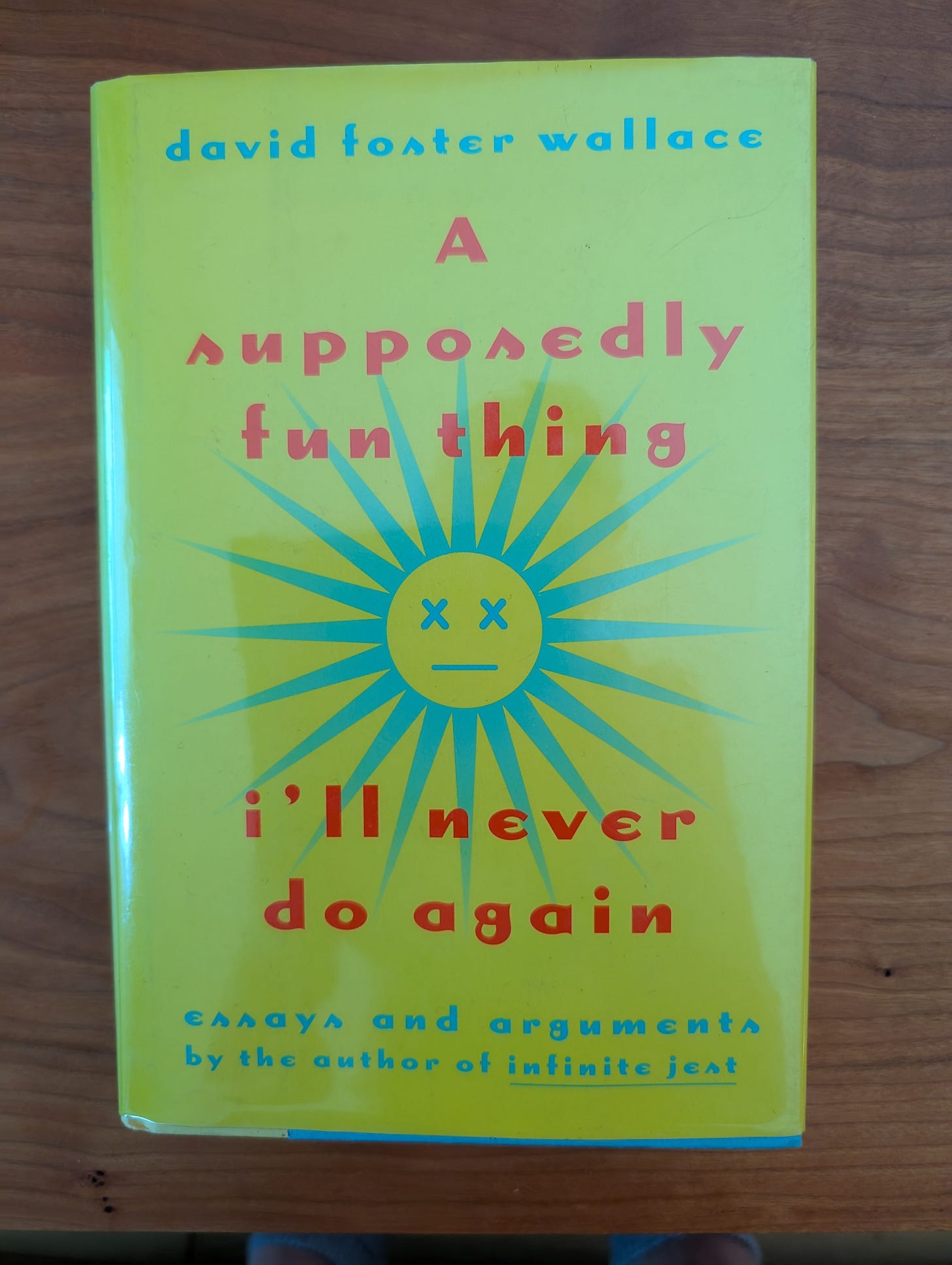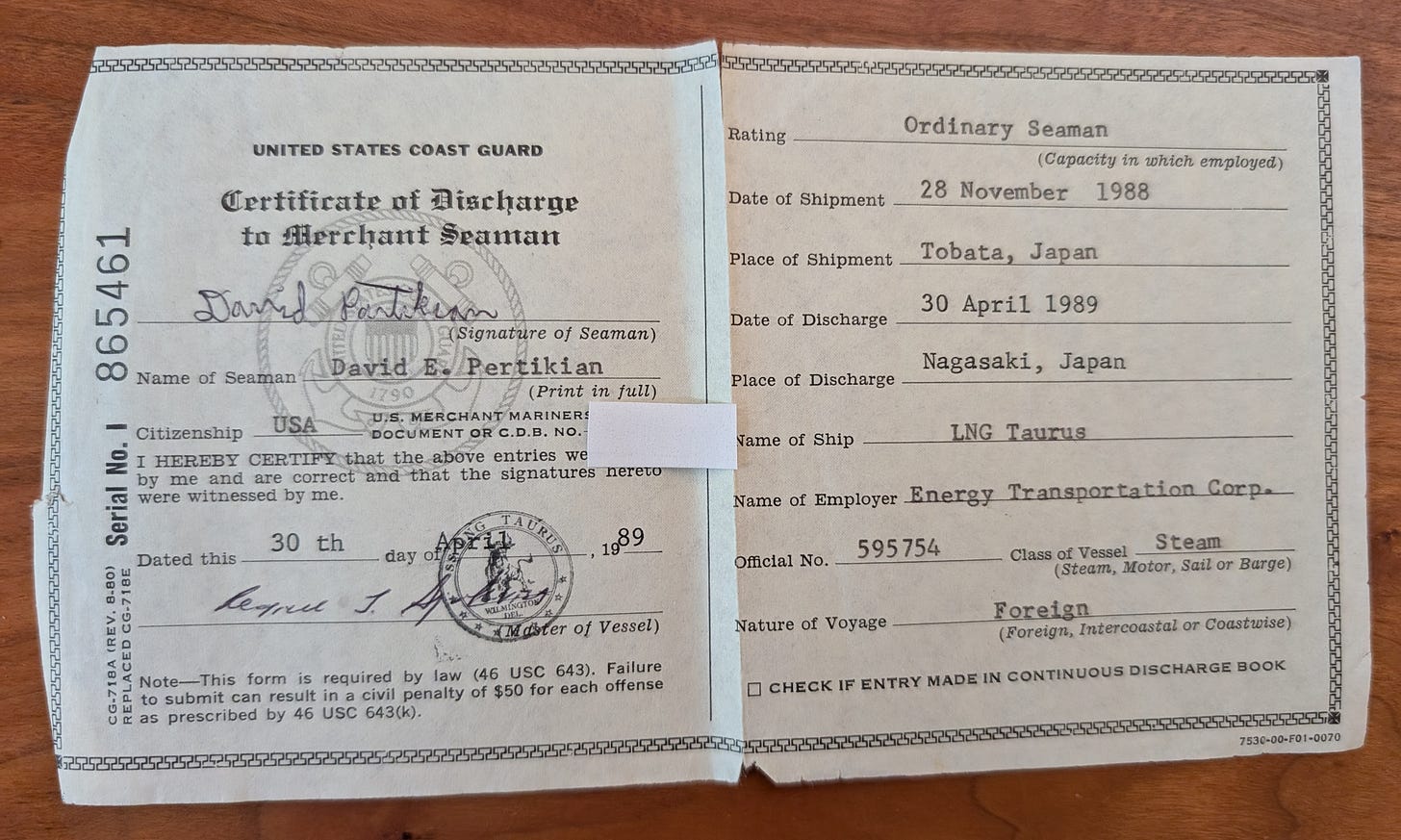Revisiting David Foster Wallace's 1996 Essay "a supposedly fun thing i’ll never do again" (Originally published in Harper's as "Shipping Out")
The first installment in a planned series on maritime memories
As a retired mariner, I’ve always rolled my eyes in disgust at the mere thought of ever paying to sequester myself on a floating luxury hotel, a.k.a. a cruise ship, in an attempt to have fun and relax.1 Whenever I encounter a friend or acquaintance rhapsodizing about a recent or upcoming cruise2 my rote retort is: “You couldn’t get me on a ship unless I am paid, not vice versa. My going rate is at least $450 a day; call it a toleration fee.”
To me, a ship represents a dangerous floating factory with nasty smells--anti-aromas, if you will--coarse conversations, mind-numbing routines, barely digestible food dished out thrice daily,3 as per contractual obligation, and crushing fatigue often exacerbated by seas on the beam causing lulling 7–10-degree rolls, just enough to be annoying. In short, my experience with ships is intricately associated with labor and necessity, words embodied by the French verb travailler, to work. Of course, this verb has the obvious English language cognate: travail, but also the slightly less obvious one: travel. Traveling involves work, something the travel and leisure industry is very keen on wanting their customers to forget completely. Hence the linguistic absurdity of traveling without any travail, which is precisely what a Harpers editor asked of journalist David Foster Wallace in 1995 when the author was tasked with sailing aboard the MV Zenith, immediately rechristened the Nadir,4 on a one-week pleasure cruise from Florida to no place in particular.
Photo: My first edition of a supposedly fun thing i’ll never do again
Now sending a reclusive hyper-intelligent literary genius with depressive tendencies into a controlled environment that caters to a mainstream concept of fun is not exactly bound to elicit elation—which is, of course, the whole point. It did, however, predictably result in a hysterical, detail-obsessed, novella-length rumination deploring almost every aspect of a pleasure cruise. The possibilities of asking an author who is largely incapable of having fun to expand upon it are virtually limitless, and David Foster Wallace exceeded all reasonable expectations in his misanthropy and scathing observations.5
During a recent reread of DFW’s seminal essay, I was struck with just how well a supposedly fun thing i’ll never do again fits into the canon of maritime literature, this despite the author’s almost total blissful ignorance of basic maritime terms, e.g. his use of walls for bulkheads and floor for deck.6 That quibble aside, I found myself reminiscing and recalling anecdotes from various voyages throughout my career and scribbling copious notes in a journal as I reabsorbed DFW’s trenchant observations on enforced fun. As it turns out, mariners have to cope with many of the same absurdities that that DFW did.7 In coming days, I will expand upon many of the ideas that are broached in a supposedly fun thing i’ll never do again as I relate to them and reminisce about a career in maritime. My observations are not to belittle or pick fault with DFW,8 who wore a Spiderman cap as an adult to flaunt his outsider status and invite tacit scorn, but to compare his own trenchant observations with my own, which celebrate that my maritime career is, at this point, but a blissful memory.
Photo: My USCG discharge from my first job in maritime. Note the length of time that I was on the LNG Taurus. That wasn’t no seven-day pleasure cruise doing nothing. . .
I will however consider actually travelling from A to B on a ship—in other words—using a ship as a mode of transportation. The idea of embarking on a European vacation and not having to fly from JFK to Frankfurt is extremely enticing and delightfully anachronistic. Avoiding a middle seat is worth 4.5 days at sea and a horrendous, checking account depleting bar tab.
Dialogue that I unfortunately hear more and more, now that I am in my sixties, an age where those who never worked maritime have the time, funds, and inclination to become stereotypical, e.g. aging, cruise passengers.
Four times if one counts “Night Lunch,” a type of horrid mystery meat “charcuterie” plate that appears in the fridge nightly and which demands either its own essay or mocking description, “Horse dick” being the ubiquitous oft-utilized descriptor. More on night lunch in an upcoming essay, since it is low hanging fruit (3a) for a literary minded sailor.
3a: Though there is—as a rule--no fruit on a night lunch plate. Any such fruit is allegorical.
Naming a ship in a work of fiction is among the more enjoyable tasks for a writer with no ship name surpassing that of B. Traven’s eponymous Deathship, the dilapidated freighter Yorrike.
I first read a supposedly fun thing i’ll never do again while on the SS Kauai, a freighter plying trade between Seattle, Oakland, and Oahu. I was good friends with the captain and tried to pass along the book of essays to him when I finished. He declined and replied: “Wasn’t that the author who killed himself? Why would I want to read what a depressive thinks about being on a ship? We all have to cope with being out here by keeping a positive outlook.”
This is puzzling considering DFW’s virtual mastery of every word in an unabridged English language thesaurus. It’s as if DFW deliberately eschewed maritime terms, all while somehow gloating while utilizing the correct term, porthole, for window.
Though most lack the eloquence to hold an audience.
DFW is one of the top authors of his generation and many of his essays are masterpieces. Never a fan of his fiction, however, I struggled mightily with Infinite Jest, giving up two thirds of the way through the tome, and actually, while 3rd Mate on the scientific research MV Marcus Langseth, used my copy as jettison (8a) to lighten my sea bag upon departure.
8a: A nautical term DFW did not utilize in a supposedly fun thing i’ll never do again though he was probably presented with ample opportunity to do so.




